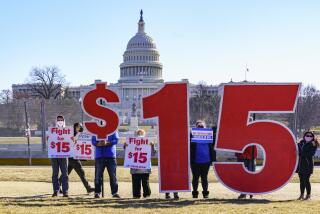Minimum Wage Hike OKd as Part of Bankruptcy Bill
- Share via
WASHINGTON — The Senate voted Wednesday to raise the minimum wage from $5.15 an hour to $6.15 over the next three years as part of a wide-ranging bill reorganizing the bankruptcy laws to make it harder for individuals to cancel credit card debts and other obligations by filing for bankruptcy.
The bill was approved by a vote of 83 to 14 and now goes to a conference committee with the House, which passed a narrow bankruptcy bill last year.
The debate over the dry technicalities of bankruptcy law was overshadowed briefly by presidential politics. Vice President Al Gore rushed back from a New York campaign trip to preside over the Senate so he could cast a tie-breaking vote on an abortion-related amendment to the bill.
But Republicans in large numbers voted for the amendment, which passed, 80 to 17, denying Gore a chance to cast a dramatic vote reaffirming his commitment to abortion rights. The amendment says that people who owe fines and civil judgments for violating the laws that protect abortion clinics cannot file for bankruptcy to avoid paying these financial penalties.
“This is an issue that does help define us as a nation,” said Gore, in a Capitol Hill news conference before the vote. “Women must have the right to choose. Those who would take it away must not be allowed to take it away.”
Republicans derided Gore’s rush to the Senate chamber, saying that it amounted to mere political “theater” to help the vice president shore up his standing with abortion rights advocates. His rival for the Democratic presidential nomination, former Sen. Bill Bradley of New Jersey, has been citing votes Gore took earlier in his career that were in sync with anti-abortion forces.
“I like the theater that’s going on,” said Sen. Charles E. Grassley (R-Iowa), chief sponsor of the bankruptcy bill. “We may see it several times between now and November.”
Just before the vote on the abortion clinic amendment, Sen. Orrin G. Hatch (R-Utah), who had been arguing against the measure all morning, abruptly reversed field. Hatch said that he and Majority Leader Trent Lott (R-Miss.) would urge lawmakers to vote for the measure so “nobody will be able to politically demagogue this issue.”
To be on hand for the voting, Gore hurriedly took a 9 a.m. commercial flight to Washington from New York, where he had been shaking hands with early morning commuters at Grand Central Station. His official plane, Air Force Two, needed more turnaround time and a rest for the crew after an early morning flight from New Hampshire. The Gore motorcade rushed from Manhattan to Queens’ LaGuardia Airport and, with sirens blaring, barreled onto the tarmac to the ramp for a USAirways flight bound for Reagan National Airport here.
Despite its easy passage through the Senate on Wednesday, the bankruptcy bill faces a precarious route to final passage. The Clinton administration wants the minimum wage increased in two years rather than three and also believes that the bill is too tough on debtors. Either objection might lead to a veto.
Senate Minority Leader Tom Daschle (D-S.D.) told reporters that the minimum wage issue should be stripped out of the bankruptcy bill altogether. The House is going to vote on the minimum wage as a separate, “free-standing bill,” Daschle said. He said that the Senate too should use that approach “as the vehicle for a good debate on minimum wage.”
The bill approved Wednesday aims to stem the rising tide of consumer bankruptcies, which reached 1.4 million in 1998. Backers of a change in the law said that too many people are escaping responsibility by filing for bankruptcy.
About 70% of people file for bankruptcy protection under Chapter 7, which allows cancellation of credit card debts and other unsecured obligations. The rest of the filers use Chapter 13, which provides for partial or complete repayment of the debts.
The Senate bill would establish an income test to place people automatically in Chapter 13 under certain standards. The individual must agree to a Chapter 13 filing if he or she has enough income to repay at least 25% of the debts, or $15,000, whichever figure is less. The debt must be repaid over five years.
The bill also would require companies to supply new information for all credit card holders: a monthly bill would state how long it would take a consumer to pay off the debt while making the minimum payment. Companies also would be required to explain clearly when they impose late fees.
Times staff writer James Gerstenzang contributed to this story.
More to Read
Get the L.A. Times Politics newsletter
Deeply reported insights into legislation, politics and policy from Sacramento, Washington and beyond. In your inbox twice per week.
You may occasionally receive promotional content from the Los Angeles Times.











